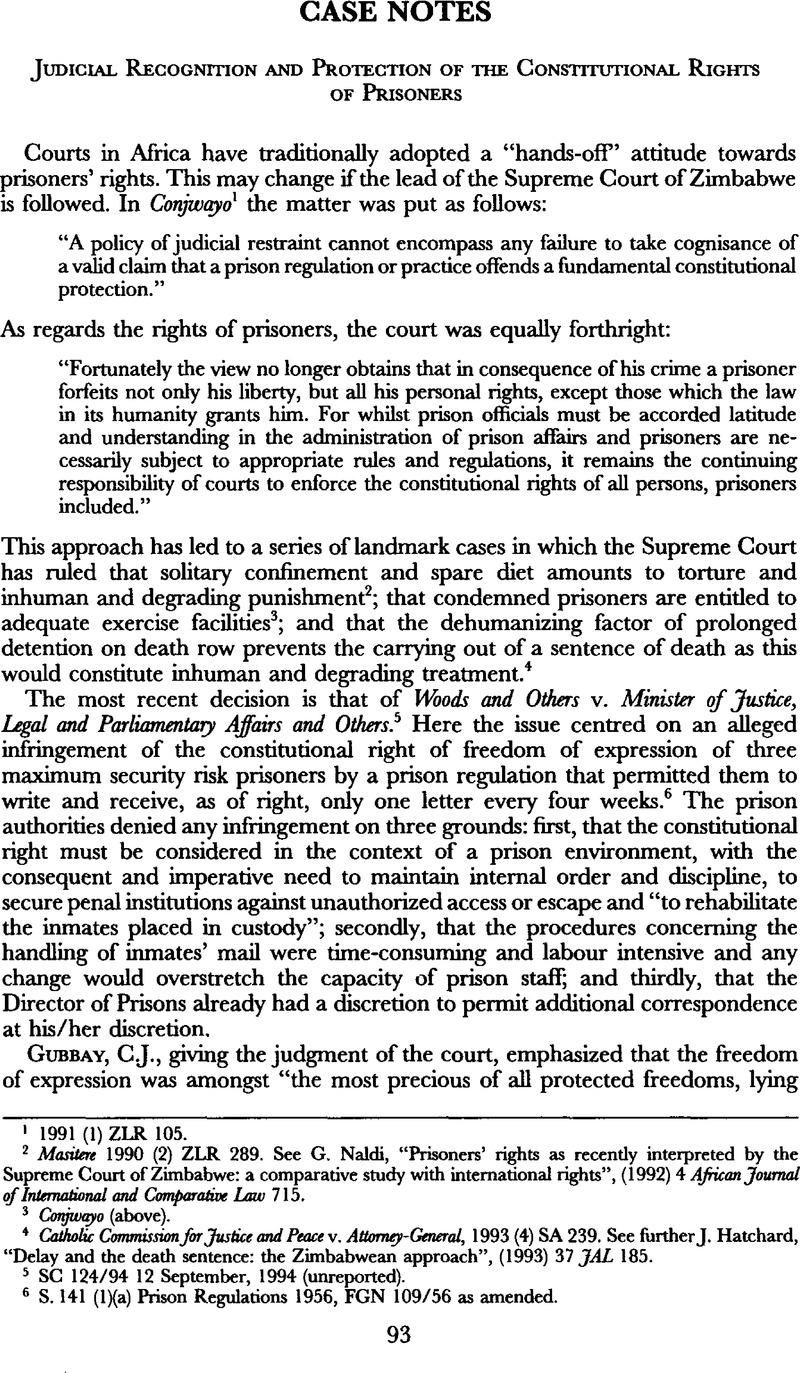No CrossRef data available.
Published online by Cambridge University Press: 28 July 2009

1 1991 (1) ZLR 105.Google Scholar
2 Masitere, 1990 (2) ZLR 289.Google Scholar See Naldi, G., “Prisoners' rights as recently interpreted by the Supreme Court of Zimbabwe: a comparative study with international rights”, (1992) 4 African Journal of International and Comparative Law 715.Google Scholar
3 Conjwayo (above).
4 Catholic Commission for Justice and Peace v. Attorney-General, 1993 (4) SA 239.Google Scholar See further Hatchard, J., “Delay and the death sentence: the Zimbabwean approach”, (1993) 37 JAL 185.CrossRefGoogle Scholar
5 SC 124/94 12 September, 1994 (unreported).
6 S. 141 (l)(a) Prison Regulations 1956, FGN 109/56 as amended.
7 Applying In re Munhumeso (Supreme Court of Zimbabwe, 1993, unreported).
8 Applying Milwaukee Social Democratic Publishing Co. v. Burleson 255 US 407 (1921) where (at 437) Holmes, J., stated that “… the use of the mails is almost as much a part of free speech as the right to use our tongues”.
9 Golder v. United Kingdom (1975) 1 EHRR 524 at 539Google Scholar and Silver v. United Kingdom (1983) 5 EHRR 347 at 371.Google Scholar
10 Applying In re Munhumeso (above) at 14 and Commissioner of Taxes v. C. W. (Pvt) Ltd. 1989 (3) ZLR 361 at 370.Google Scholar
11 Rule 37.
12 At 5 and applying, amongst other cases, Procurier v. Martinez 416 US 369 (1974) at 409.Google Scholar
13 See, for example, the U.S. case of Alberti v. Sheriff of Harris County 688 F. Supp 1179 (S. D. Texas, 1987).
14 No decision from any other African jurisdiction was cited in Woods.
15 Behind the Wall: A Report on Prison Conditions in Nigeria and the Nigerian Prison System, Civil liberties Organization, 1991, 267.
16 This is in stark contrast to India where the courts have been extremely active in this field.
17 For example, Clark reports that neither a Lexis search of the thousands of reported cases on prisoners' rights in the United States nor an examination of the enormous literature on the subject revealed more than a few references to the SMR. A search in other jurisdictions also produced similar results: see Clark, R.The United Motions Crime Prevention and Criminal Justice Program: Formulation of Standards and Efforts at their Implementation, Philadelphia, 1995, 178–179.Google Scholar
18 See, for example, Lillich, R. B., International Human Rights: Problems of Law, Policy and Practice, 2nd ed., 1991, 233–307.Google Scholar
19 Commonwealth Correctional Administrators have also noted that the implementation of the SMR present difficulties due to such factors as overcrowding, high costs of building and staffing. The possibility of developing Commonwealth Minimum Standard Rules is being actively considered: see generally, Report of the Third Conference of Commonwealth Correctional Administrators, Commonwealth Secretariat, 1992, xxiv.
20 See the CCJP case (above).